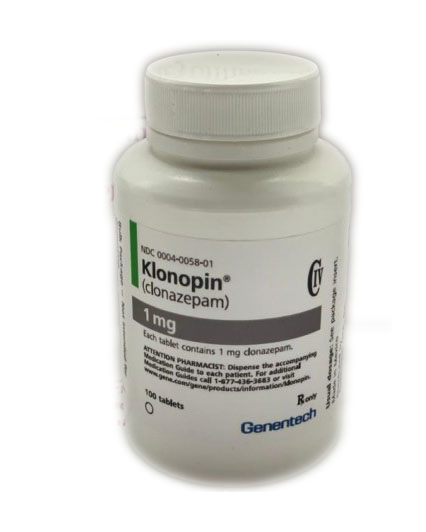Klonopin (Clonazepam)
Klonopin, which is the brand name of Clonazepan, acts as a tranquilizer, part of the family of drugs under the umbrella term ?benzodiazepine?. This prescription drug is used to help avoid or treat anxiety disorders, seizures and a specific movement disorder, namely akathisia.
By attaching to GABA receptors, Klonopin increases the effect of certain neurotransmitters to relieve the user of their symptoms. After taking Klonopin, the effects will come about within one hour and last for up to twelve hours.
Buy Klonopin (Clonazepam) Online Without Prescription
|
|
Who Should Take Klonopin?
As one of the most prescribed drugs in the US, Klonopin (Clonazepam) helps treats various disorders and medical issues.
- Seizures: Although it is rarely prescribed for long-term usage to help patients that suffer from seizure incidents, Klonopin is often the short-term response to an episode. Likewise, doctors often prescribe clonazepam to address epileptic episodes in children. The one group that also seems to benefit from long-term consumption of Klonopin are people who suffer from resistant epilepsy.
- Anxiety: Panic disorder is one of the most common reasons that your doctor will prescribe Klonopin for, while social phobia and acute mania are also some disorders that it can help with. Nonetheless, people with panic disorders are the ones most likely to benefit from this medication, even with long-term usage.
When it comes to disorders related to the muscles, such as restless legs syndrome, bruxism, akathisia and spasticity, there are evidence of successful treatment using Klonopin without approval for long-term usage or any monitored trials of patients.
Using Klonopin: 5 Step Guide
Generally, you should rely on your doctor?s advise when it comes to consumption of Clonazepan, while also consulting your pharmacist?s medication guide. Some basic guidelines on taking Klonopin orally include:
- Take this drug two or three times per day.
- Do not take over the dosage prescription. This varies according to your health status, age, sex and weight when it comes to children.
- For best outcomes, you must always take Klonopin multiple times, ideally, during the same time of day. This way you are not likely to forget to take a dose.
- You should never increase the dosage of Klonopin without consulting your doctor first, although the effects might not be as strong after you have been taking the drug for a long time.
- If your medical condition does not improve after taking Klonopin for a while, you should inform your doctor to change medication.
Although Clonazepan helps many people with anxiety disorders and seizures, this drug can also lead to addiction. To avoid such negative outcomes, do not exceed the prescribed dosage and also inform your physician about any addictions that you might be suffering from.
Common Side Effects & Interactions
Klonopin (Clonazepam) is best to treat some medical conditions but it comes with certain side-effects in many instances. You must inform your doctor if any of the following appear:
Common Side Effects: Dizzy, drowsy, fatigue and feelings of disorientation are included in this category.
Reported Side Effects: Suicidal, depression and feelings of sudden mood change have also been reported, although rarely.
Rare Side Effects: Allergic Reaction.
Klonopin might also cause negative reactions if taken in conjunction with other medications. This is more common when you consume drugs to treat similar issues that are also addressed by Klonopin. Drugs that are very likely to lead to serious side-effects if consumed simultaneously with Klonopin include:
- Codeine
- Hydrocodone
- Alcohol
- Cannabis
- Alpazolam
- Lorazepam
- Zolpidem
- Carisoprodol
- Cyclobenzaprine
- Diphenhydramine
- Cetirizine
You must inform your personal doctor after their diagnosis, so that they know which is the best route of treatment for your symptoms. Other drugs they are likely to prescribe to treat anxiety and seizures include: Xanax, Ativan, Dalmane and Valium.


